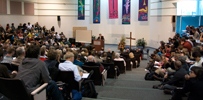Is Physician-Assisted Suicide a Human Right?
On October 10th, the B.C. Court of Appeal overturned the decision of a B.C. Supreme Court judge who, last year, struck down Canada's law prohibiting doctor-assisted suicide. This ongoing public debate affects us all. Before that decision was released, we asked a thoughtful Christian to contribute his perspective on this issue as a concerned Canadian citizen. This is what Prof. Iain Provan had to say.
Question: Why do you think there has been a recent and increasingly vigourous push for the legalization of physician-assisted suicide in Canada?
IP: In Canada, we’re living in a world where individual autonomy is the major lens through which people see reality. “My right to die” is simply one aspect of a broader worldview where I am entitled to exercise my individual rights without interference from the state or my neighbours.
Question: Do you think that rights language—“the right to die"—is the correct language to use when talking about euthanasia? Is it a valid human right?
IP: Once again, the language of rights is contingent on what worldview one holds. If one sees society simply as a collection of autonomous individuals, then it is easy to understand why someone might believe in “my right to die”. However, if one sees life as a gift from someone else (like God), it becomes nonsensical to talk about control over one’s death as a right. This issue (like others) cannot be discussed apart from the larger story.
As a Christian I, myself, am very comfortable with the language of rights. As image bearers of God, we certainly do have rights. But who you think gives human rights and who determines the constraints on exercising those rights makes a world of difference.
Question: In light of this issue being contingent on one’s worldview, one’s larger story, do you think there is a "secular" rationale against legalizing physician-assisted suicide?
IP: Certainly. Citizens of Canada should be concerned about this issue for all sorts of reasons that are not exclusively Christian. For one thing (and in spite of what people often claim), the choice to die or live is deeply influenced by society at large; there is no influence-free zone in which purely autonomous or free choices are made. And especially in a society in which it is becoming increasingly “inconvenient” to provide for the burgeoning elderly population, it is all too easy for people to feel both overt and covert pressure to “cease being an inconvenience.” People may well feel that they are becoming a burden to their family and to the health system. Once we erode the absolute protection of life, and even begin to allow professionals to participate in actively causing or facilitating death, we’re opening up a wide door for all sorts of bad things to happen.
Question: Do you think, then, that Christians should seek to legislate our worldview on this occasion?
IP: In the Christian story, humans are the image bearers of God from conception to the grave – this has always been the Christian conviction. It is the erosion of this story that even allows the issue of euthanasia to arise in public discourse as a viable possibility. Our ethical position should not be in question. However, the extent to which we should argue for Christian ethical positions being given or retaining legislative force needs to be thought out on a case-by-case basis. We must always remember that, although morality and law overlap, they are not synonymous.
Having said that, I believe that changing Canadian law to allow physician-assisted suicide would be destructive to all of society, and I think that one can make that case on grounds other than simply Christian ones. Canadian society mostly agrees already that society should try to protect the mentally ill from injuring themselves. Why should this be the case for a mentally ill person but not for a physically ill person? Why is the “right to choose” applied in some cases but not in all?
Question: In your opinion, what is the way forward on this issue?
IP: In general, Christians must continue to contribute to public debate and endeavour to persuade all kinds of people about what the good society looks like on grounds that those people can accept even if they are not Christians—on such common ground as continues to exist. On this specific issue: we should oppose legislation that enables the erosion of the sanctity of life; we should oppose the legalization of physician-assisted suicide.
For further thoughts on this topic, Dr. Provan suggests tapping into this resource: The Euthanasia Prevention Coalition. See also the report on local doctor Will Johnston's address last year to the Catholic Physician's Guild.
Dr. Iain Provan is the Marshall Sheppard Professor of Biblical Studies at Regent College. He has written numerous essays and articles, and several books including commentaries on Lamentations, 1 and 2 Kings, Ecclesiastes, and Song of Songs. Hot off the press is Dr. Provan's most recent book Convenient Myths.
Among other courses, Dr. Provan will be teaching Living with Beastly Empires: The Book of Daniel in Summer 2014 at Regent College.
Attend an event to hear Iain speak or visit Regent Audio to download his public lectures, courses, and more.




